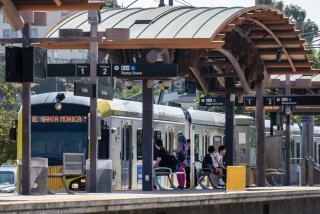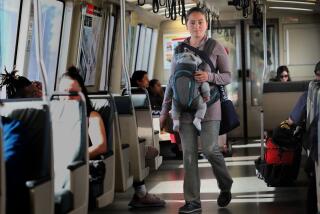Conejo School Board to Weigh Lower Bus Pass Fee
- Share via
Thousand Oaks school officials tonight will consider lowering the fees charged to parents for busing students to school in the hope of attracting more riders and thus generating more money to cover the program’s costs.
The Conejo Valley Unified School District has fallen $140,000 short of breaking even on the bus program this year because more than half of the former riders stopped taking the bus after the district began charging $225 for a semester bus pass last fall.
In addition, more students than expected qualified for reduced or free ridership because they are from low-income families, officials said.
“We didn’t do a survey and ask everyone why they left, but most people who commented have cited the price,” said Assistant Supt. Sarah Hart. “It’s just too expensive.”
The proposal before the school board would lower the bus pass fee to $180 per semester, or $360 per year. But to make the program self-supporting at that price, ridership must increase from the current 774 riders to 1,272.
Although administrators have recommended that the school board lower its bus pass charge, they also said the board could abolish bus service for all but those students in special-education programs. The state Supreme Court ruled in March of last year that public schools are legally obligated to bus only special-education students.
“I think that would pose a real burden on parents who have to leave early for work in the morning, or mothers who have babies or other small children,” Hart said.
It would also force school athletic teams to charter buses or rely on parents to ferry them to out-of-town games, Hart said.
As school administrators look for ways to cut $2.1 million from the $75-million budget, many of them feel that busing is more easily expendable than teachers or textbooks, which compete for school-district dollars.
“Obviously, there are people who don’t want to pay for bus service, but maybe we’re not hearing lots of complaints because parents accept it as inevitable,” Hart said.
Before Thousand Oaks schools began charging for a bus pass, about 2,000 students rode buses at an annual cost of nearly $600,000. But in the fall, the 17,700-student district became the only one in Ventura County to charge for buses picking up students in the morning and taking them home after school.
Officials knew ridership would drop after the fees were imposed, but they underestimated the decline, Hart said. School administrators needed 1,100 students to buy passes to break even, but they fell short by about 200 students in the first semester.
The number of bus riders dropped by another 120 students in the second semester to just 774 as parents formed car pools and developed alternatives to ferry their children to school, Hart said.
Furthermore, the district expected only 13% of students to meet low-income qualifications for reduced-price or free passes. But one-third met state requirements as of the second semester, Hart said.
The district based its estimate on the number of students qualifying for the free or reduced lunch program, Hart said. But many parents who have never applied for lunch assistance sought the free or reduced bus passes, Hart said.
Some of them told district officials that they can afford to pack a lunch for their kids but they couldn’t swing a bus pass, Hart said.
The 2nd District Court of Appeal in Ventura last month ruled that districts that charge students for bus transportation must provide fee waivers for low-income students. The ruling dictated that the state Department of Education must ensure that local districts provide the waivers uniformly.
Hart said she believes that the Thousand Oaks district complies with the court ruling. The district’s criteria for fee waivers rely on the same income figures that state officials use to determine if a family qualifies for food stamps or welfare.
More to Read
Sign up for Essential California
The most important California stories and recommendations in your inbox every morning.
You may occasionally receive promotional content from the Los Angeles Times.










